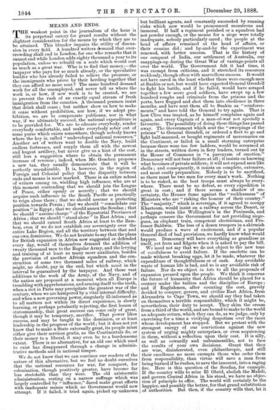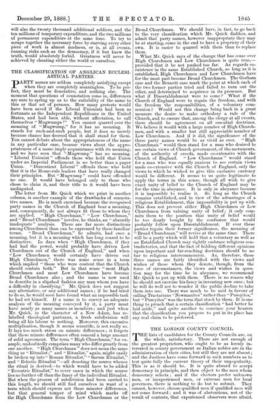MEANS AND ENDS.
TII:weakest point in the journalism of the hour is ts perpetual outcry for grand results without the slightest consideration for the means by which they are to be attained. This blunder impairs the utility of discus- sion in every field. A hundred writers demand that over- crowding shall end in London, for one who remarks that it cannot end while London adds eighty thousand a year to its population, unless we rebuild on a scale which would cost as much as a great war. Who is to find that money,—the taxpayer who pays for so much already, or the speculative builder who has already failed to relieve the pressure, or the immigrants who prove by their herding together that they can afford no more rent? The same hundred demand work for all the unemployed, and never tell us where the work is, or how, if new work is to be created, we are to prevent the rush of an exactly equal stream of fresh immigration from the counties. A thousand penmen insist that drink shall cease ; but neither show us how to make it cease without prohibition, nor how, if we adopt pro- hibition, we are to compensate publicans, nor in what way, if we ultimately succeed, the national expenditure is to be provided for. We are to educate everybody, render everybody comfortable, and make everybody sober out of some purse which exists somewhere, though nobody knows where the key is, called "undeveloped national resources." Another set of writers want to double the Navy, build endless fortresses, and supply them all with the newest and hugest artillery, but never give us a hint of the cost, still less a suggestion where to obtain the permanent increase of revenue ; indeed, when Mr. Goschen proposes a new tax, they usually demonstrate that it will be perfectly unendurable. It is, however, in the region of Foreign and Colonial policy that the disparity between ends and means is most marked. There is an entire school of writers among us, wielding high influence, who are at this moment contending that we should join the League of Peace, either openly or secretly ; that we should acquire such influence in the South Pacific as practically -to reign alone there ; that we should assume a protecting position towards Persia ; that we should "consolidate our position" in Egypt; that we should annex the Soudan ; that we should " assume charge" of the Equatorial Provinces of Africa ; that we should " stand alone " in East Africa; and that we should extend South Africa at least to the Zam- besi, even if we do not establish our sovereignty over the entire Lake Region, and all the territory between that and our own dominions. We do not hesitate to say that the plans for British expansion in Africa now suggested or defended every day, would of themselves demand the addition of twenty thousand men to the Regular Army, and the levying and training of at least as many more auxiliaries, besides the provision of another African squadron and the con- struction of some two thousand miles of railway, which might, no doubt, pay in the end, but which must in the interval be guaranteed by the taxpayer. And these vast additions to the work of the Army, of the Navy, and of the nation are proposed at a moment when all Europe is trembling with apprehensions, and arming itself to the teeth, when a riot in Paris may precipitate the greatest war of the century, when we are hampered by a vital internal difficulty, and when a new governing power, singularly ill-informed as to all matters not within its direct experience, is slowly learning, or perhaps petulantly rejecting, the first lesson of statesmanship, that great success can come only of great, though it may be temporary, sacrifice. That power likes success, and may be taught to like dominion, or at least leadership in the progress of the world ; but it does not yet know that to make a State externally great, its people must either give their services gratis, as the Continentals do, or their money to a liberal, it may even be to a burdensome extent. There is no alternative, for an old one which used to exist has disappeared through a change in adminis- trative methods and in national temper.
We do not know that we can convince our readers of the nature of this alternative, but we feel no doubt ourselves that the national resources for war, for conquest, for colonisation, though positively greater, have become far lees stretchable than they were. The old aristocratic administration, resting on a narrow suffrage which was largely controlled by "influence," dared make great efforts with inadequate means which no Government would now attempt. If it failed, it tried again, picked up unknown but brilliant agents, and constantly succeeded by running risks which now would be pronounced monstrous and immoral. If half a regiment perished or a squadron had not powder enough, or the means for a siege were totally inadequate, nobody particularly cared ; the people at the head of affairs remained at the head of affairs, or their cousins did ; and by-and-by the experiment was renewed, with better success. That is the history of our conquest of India, our settlement of Australia, our snappings-up during the Great War of vantage-points all over the world. The Government felt it had time, it was exempt from criticism, and it stretched its resources recklessly, though often with marvellous success. It would not have cared in the least whether there were enough men at Suakin or not, but would have expected General Grenfell to fight his battle, and if he failed, would have scraped together a few score good soldiers, have swept up a few hundred roughs and criminals from the prisons and the ports, have flogged and shot them into obedience in three months, and have sent them all to Suakin as "reinforce- ments," and have told the General to try again. That is how Clive was treated, as he himself complains again and again, and every Captain of a man-of-war not specially a favourite. The possibility of doing those things has passed away. The Government which sent the "sweepings of the prisons" to General Grenfell, or ordered a fleet to go and fight half-manned, or bought regiments of mercenaries on the Continent, or failed in a small storming enterprise because there were too few ladders, would be screamed at in the streets, written down in fiery leaders, turned out by the House of Commons in "a paroxysm of emotion.' Democracy will not bear failure at all ; it insists on knowing what becomes of private soldiers; it will not expend men like shells ; and consequently, it insists on complete, extensive, and most costly preparation. Nobody is to be sacrificed, so there must be two men for every man's work. Nothing is to be risked, so the best troops must always be every- where. There must be no defeat, so every expedition is great in cost ; and if there seems a shadow of un- certainty, the Houses fume against the " recklessness " of Ministers who are "risking the honour of their country." The "majority," which is sovereign, if it agreed to occupy Khartoum, would insist on a railway across the Desert, or a baggage train like Wellington's in the Peninsula, and perhaps censure the Government for not providing siege- guns, an elephant train, competent electricians, and Pro- fessor Baldwin. The loss of a dozen troopers in a skirmish would produce a wave of excitement, and if a popular General died of bad provisions, we hardly know what would happen. Democracy will have everything as grandiose as itself, yet frets and fidgets when it is asked to pay the bill. We need not say that we do not object to the new tone of carefulness to avoid failure. If the omelette can be made without breaking eggs, let it be made, whatever the expenditure of thoughtfulness or of cash. Any avoidable waste of human life is bad, and so is any avoidable risk of failure. Nor do we object in tote to all the proposals of expansion pressed upon the people. We think it concerns the future of humanity that Africa should be placed for a century under the tuition and the discipline of Europe ; and if Englishmen, after counting the cost, gravely decided to conquer, govern, and civilise East Africa, from Alexandria to Cape Town, we should say they had taken on themselves a terrible responsibility, which it might be, nevertheless, their duty to accept. They skim the cream from a third of the world, and are bound to make to the world an adequate return, which they can do, as we judge, only by exercising for a time a vivifying despotism over the races whose development has stopped. But we protest with the strongest energy of our convictions against the new system of urging mighty enterprises, or even acquiescing in them, without a reflection upon their cost. It is silly, as well as cowardly and unbusinesslike, not to face the results of your own decisions. Grant that they are wise, disinterested, even philanthropic, and still their excellence no more exempts those who order them from responsibility, than virtue will save a man from being burned if he rushes, to save the innocent, into a raging fire. Here is this question of the Soudan, for example. If the country wills to seize El Obeid, abolish the Mahdi, and govern Central Africa in his stead, we have no objec- tion of principle to offer. The world will certainly be the happier, and. possibly the better, for that grand substitution of authorities. But then, if the country wills that, let it will also the twenty thousand additional soldiers, and the ten millions of temporary expenditure, and the two millions of permanent expenditure at the same time. To try to scrape together the necessary force by starving every other piece of work is almost madness, or is, at all events, running risks such as the democracy, if it but knew the truth, would absolutely forbid. Greatness will never be achieved by cheating either the world or ourselves.



































 Previous page
Previous page